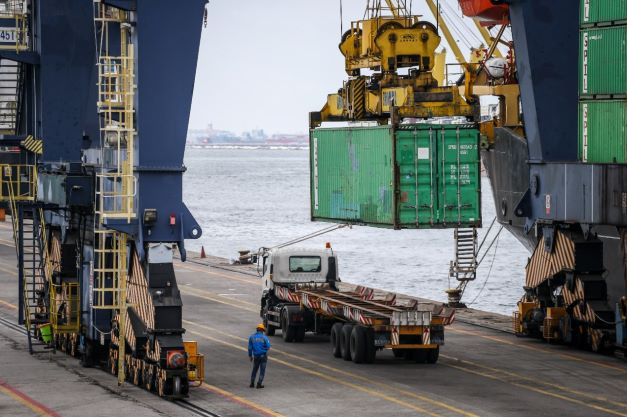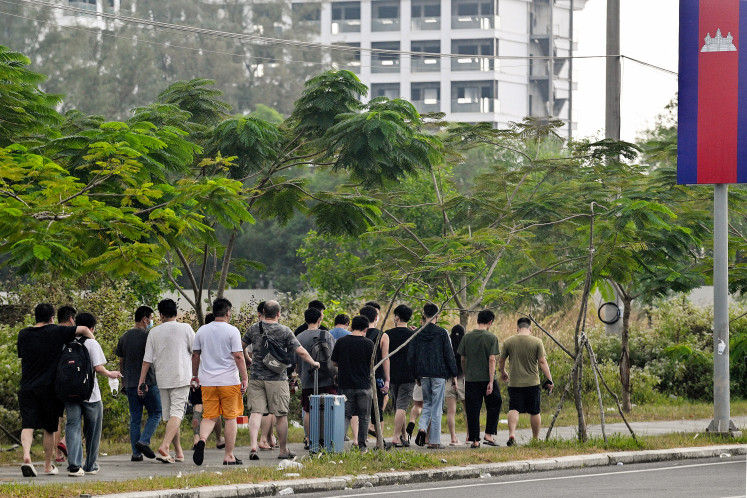Popular Reads
Top Results
Can't find what you're looking for?
View all search resultsPopular Reads
Top Results
Can't find what you're looking for?
View all search resultsRising high
Indonesia’s economy recovered strongly last year amid global shocks and high inflation pressures to reach the highest growth rate since 2014.
Change text size
Gift Premium Articles
to Anyone
A
lthough President Joko "Jokowi" Widodo, now in his ninth year in office, has never achieved the 7 percent annual economic growth he promised in the 2014 campaign, he must still rejoice at Statistics Indonesia’s (BPS) announcement of the country’s highest pace of economic expansion over the past eight years.
Indonesia’s economy recovered strongly last year amid global shocks and high inflation pressures to reach the highest rate of growth since 2014.
Even though gross domestic product was down significantly to 5.01 percent year-on-year (yoy) in the fourth quarter of 2022, from 5.73 percent in the same period in 2021, the economy saw a robust recovery to 5.31 percent for the whole year of 2022 from 3.7 percent in 2021. Given the downward trend and big risk of economic recession worldwide, the economic expansion last year was still high.
The fourth-quarter economic fall last year was likely to have been primarily caused by the high base effect from the unusually high growth in the same period of 2021, which followed the loosening of the COVID-19 curbs in the wake of the Delta wave. On a quarterly basis, the fourth quarter growth of 2022 was still slightly higher, by 0.36 percent, than the previous quarter, indicating a consistent pace of expansion, BPS announced on Monday.
Household (private) consumption, which benefitted from coordination between the fiscal and monetary authorities to maintain purchasing power amid the high inflation pressures, remained the main driver of growth even though this component has yet to recover fully to its pre-pandemic level.
Government consumption also expanded significantly in the wake of a seasonal spending trend that takes place in the last quarter of every fiscal year when the government usually expedites the disbursement of its budget. Investment, benefitting from the government's strong policy of pressuring companies to develop the mineral-refining industry, also performed fairly well.
This year, however, the country’s economic prospects are predicted to be slightly less rosy as concern over a potential economic downturn presses down demand for commodities. Private investment sentiment could also be affected by political jockeying in the lead-up to the 2024 presidential and legislative elections, although mineral-related investments will likely remain robust due to the government export ban on bauxite and copper within the next few months.
Nevertheless, the downside risks to growth are substantial and could weigh heavily on Indonesia’s growth. Weaker global demand, tighter global finances, broad-based capital outflows and currency pressures could trigger a more-rapid monetary policy tightening cycle.
Average inflation is still projected to peak this year at 4.5 percent. The Consumer Price Index (CPI) or headline inflation on an annual basis was at a five-month low of 5.28 percent yoy in January, down from 5.51 yoy last December. Yet it was still above the upper limit of Bank Indonesia’s (BI) 2-4 percent target.
BI Governor Perry Warjiyo is highly confident that the Indonesian economy is still solid with economic growth this year predicted in the range of 4.5-5.3 percent and 4.7-5.5 percent in 2024, despite the World Bank revising down its growth estimate for Indonesia to 4.8 percent. Several analysts foresee a 4.9 percent expansion.
Meanwhile, the country’s external resilience also remains stable. The current account is projected to book a 0.4 percent surplus, or 0.4 percent deficit of GDP this year, followed by a range of 0.2 percent surplus to 0.6 percent deficit in 2024. Bank credit disbursement will grow in the range of 10-12 percent in 2023 and 2024.
This strong position could reduce the risks of massive capital outflows despite the United States Federal Reserve indicating last week continuing its rate increases.
There are many reasons to stay cautiously optimistic indeed.











